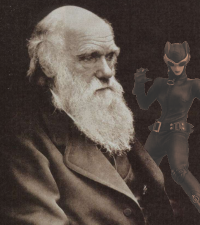April 21, 2007
Outsmarting the Great Engineer
 Nick Bostrom and I have written a book chapter, The Wisdom of Nature: An Evolutionary Heuristic for Human Enhancement on the application of evolutionary biology to human enhancement.
Nick Bostrom and I have written a book chapter, The Wisdom of Nature: An Evolutionary Heuristic for Human Enhancement on the application of evolutionary biology to human enhancement.
The basic argument is simple: when you propose an enhancement, someone is bound to ask "if that's such a good thing, why haven't nature already given us the trait?" And it is a relevant question: evolution is a great engineer in the sense that it produces organisms that function well (never mind the piles of bones on the workshop floor). It might be hard to improve on quasi-perfection.
Our paper looks at ways evolution might not give us what we want. It could be that evolution designed us for an environment we are no longer living in - keeping down brain energy requirements made sense when food was scarce, but today we should rather tweak our metabolic setpoints down to avoid obesity, despite the disadvantage that and large brains would have been in the Pleistocene.
Another reason why evolution might not have done what we want is simply that evolution doesn't optimize things after human values - contraception is a great thing for people, but from an evolutionary fitness perspective it is not anything evolution would have aimed for.
Finally there are a large number of things that evolution cannot do. Some things are impossible to do with our kind of biology or surrounded by vast deserts in the fitness landscape - diamond skeletons and radios are hard to evolve. Sometimes we get trapped in local optima, such as the appendix (evolving a smaller one increases the risk of appendicitis, despite that having an appedix in itself appears to be a slight fitness disadvantage). Evolution may also have a hard time keeping up with changing conditions.
All in all, if a proposed enhancement looks like it fits one of these possibilities we have a good reason to think that we know why nature did not give it to us. If we can't find any such explanation or if we get contradictory results, then it is a signal for caution. For example life extension gets a green light (evolution does not select for post-reproductory life strongly, antagonistic pleiotropy, differing human values etc) although this by no means shows that it will be easy to do. Removing sleep on the other hand looks like a red light (obvious disadvantage in terms of predation, no function known for certainty, yet strongly conserved across a big chunk of the animal kingdom).
The chapter is still being revised, and Nick and I would like to hear your comments. If you have read it and would like to comment, email anders.sandberg at philosophy.ox.ac.uk.
Posted by Anders3 at April 21, 2007 01:42 AM